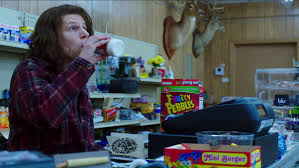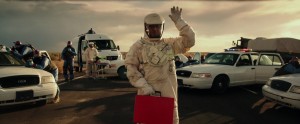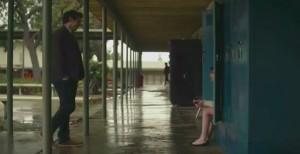A TALE OF TWO JESSES: American Ultra and The End of the Tour
Posted: August 30, 2015 | Author: Donald | Filed under: Uncategorized | Tags: American Ultra, Bill Pulman, Clouds of Sils Maria, Connie Britton, David Foster Wallace, David Lipsky, Donald Margulies, Infinite Jest, James Ponsoldt, Jason Segel, Jesse Eisenberg, Joan Cusack, John Leguizamo, Kristen Stewart, Lavell Crawford, Max Landis, Nima Nourizadah, Rolling Stone, Sam Malone, Still Alice, Stuart Greer, The End of the Tour, Tony Hale, Topher Grace, Walter Goggins | 7 Comments »First, a word from our sponsors: I am now offering a new service: so much emphasis has been given lately to the importance of the opening of your screenplay, I now offer coverage for the first twenty pages at the cost of $20.00. For those who don’t want to have full coverage on their screenplay at this time, but want to know how well their script is working with the opening pages, this is perfect for you. I’ll help you not lose the reader on page one.
Ever wonder what a reader for a contest or agency thinks when he reads your screenplay? Check out my new e-book published on Amazon: Rantings and Ravings of a Screenplay Reader, including my series of essays, What I Learned Reading for Contests This Year, and my film reviews of 2013. Only $2.99. http://ow.ly/xN31r
and check out my Script Consultation Services: http://ow.ly/HPxKE
Warning: SPOILERS
 I’ve always had mixed feelings about the actor Jesse Eisenberg. His stuttering performances, his “gee gosh” can’t look you in the face acting technique, his off beat visage, have actually, if I must be honest, and I guess I must, I must, put me off at the beginning and often quite annoyed me.
I’ve always had mixed feelings about the actor Jesse Eisenberg. His stuttering performances, his “gee gosh” can’t look you in the face acting technique, his off beat visage, have actually, if I must be honest, and I guess I must, I must, put me off at the beginning and often quite annoyed me.
And, as I also said to my friends: Aren’t Jessie Eisenberg, Michael Cera and Paul Dano actually the same person? I mean, have you ever seen them in a room together?
As time has gone on, as time is want to do, as we know from Casablanca, and as Eisenberg has made more and more interesting choices in film roles (from The Squid and the Whale to The Social Network to Night Moves to The Double), he’s sort of won me over and I even look forward to his next endeavor.
Well, his next endeavor, nay, endeavors, we now have, and they come in the form of two new films: American Ultra and End of the Tour.
American Ultra is about a slacker, stoner Peter Pan, called Mike, who works at a convenience store in a small town that he can’t seem to leave because he has an agoraphobic reaction whenever he tries. He lives with a long suffering girlfriend Phoebe who he has decided to ask to marry him. But something happens that causes his best laid plans to go awry. Read the rest of this entry »
WHERE’S THE REST OF ME: Movie Reviews of the The Signal and Night Moves by Howard Casner
Posted: June 22, 2014 | Author: Donald | Filed under: Uncategorized | Tags: Beau Knapp, Brenton Thwaites, Carlyle Eubank, Dakota Fanning, David Frigerio, James Le Gros, Jesse Eisenberg, Jonathan Raymond, Kelly Reichardt, Laurence Fishburne, Matt Malloy, Night Moves, Olivia Cooke, Peter Sarsgaard, The Signal, William Eubank | 6 Comments »First, a word from our sponsors. Ever wonder what a reader for a contest or agency thinks when he reads your screenplay? Check out my new e-book published on Amazon: Rantings and Ravings of a Screenplay Reader, including my series of essays, What I Learned Reading for Contests This Year, and my film reviews of 2013. Only $2.99. http://ow.ly/xN31r
Warning: SPOILERS
 Two movies have opened that seem to have never heard of the rule that today your screenplay must begin with a grabber scene, it simply has to. You know, something that happens in the first ten pages that attacks the face and thrusts its whatever it was down your throat like that creature in Alien?
Two movies have opened that seem to have never heard of the rule that today your screenplay must begin with a grabber scene, it simply has to. You know, something that happens in the first ten pages that attacks the face and thrusts its whatever it was down your throat like that creature in Alien?
Instead the filmmakers seem to feel that the slow build, the taking the time to create context for the characters and the situation, the use of an approach that invites us along for the ride rather than assaults us, is the more effective way to go. Wow, what a concept. Read the rest of this entry »
TEENANGSTERS AND DOPPLEANGSTERS: Movie reviews of Palo Alto and The Double by Howard Casner
Posted: May 26, 2014 | Author: Donald | Filed under: Uncategorized | Tags: Avi Korine, Cathy Moriarty, Chris Messina, Chris O’Dowd, Craig Roberts, Emma Roberts, Gia Coppola, Jack Kilmer, James Fox, James Franco, Jasmine Paige, Jesse Eisenberg, Kobna Holdbrook-Smith, Mia Wasikowska, Nat Wolf, Noah Taylor, Paddy Considine, Palo Alto, Richard Ayoade, Sally Hawkins, The Double, Wallace Shawn | 678 Comments » Palo Alto is about teenage angst and existential ennui, just like the Twilight series, but without the werewolves and vampires, though almost as painful to get through (sorry, but it’s true).
Palo Alto is about teenage angst and existential ennui, just like the Twilight series, but without the werewolves and vampires, though almost as painful to get through (sorry, but it’s true).
The story revolves around three teens: April (Emma Roberts), Teddy (Jack Kilmer) and Fred (Nat Wolf) who are going through the throes of finding themselves. Unfortunately, the throes they are going through are pretty much the same throes that millions of other movie teens have pretty much gone through in millions of other movies before this and dramatized in pretty much the same way as those millions of others that came before as well. Read the rest of this entry »
Movie Reviews of NOW YOU SEE ME and THE HISTORY OF FUTURE FOLK by Howard Casner
Posted: June 15, 2013 | Author: Donald | Filed under: Uncategorized | Tags: April L. Hernandez, Boaz Yakin, David Franco, Ed Solomon, Edward Ricourt, Isla Fisher, Jay Klaitz, Jeremy Kipp Walker, Jesse Eisenberg, John Mitchell, Louis Leterrier, Mark Ruffalo, Melanie Laurent, Michael Caine, Morgan Freeman, Nils d’Aulaire, Now You See Me, Onata Aprile, The History of Future Folk, Woody Harrelson | 23 Comments »Now You See Me is a very enjoyable shaggy dog story about magicians. However, the biggest sleight of hand by writers Ed Solomon, Boaz Yakin, Edward Ricourt and director Louis Leterrier is how they’re able to make the audience overlook what is at times an unconvincing and questionable plot and go along with the often preposterous goings on, and like any spectator at a Las Vegas Show, love every minute of it.
The story opens with four practitioners of the art of prestidigitation receiving mysterious summonses from a total stranger—and they actually show up at the time and place requested—why?, well, you’re so busy looking at everything else going on you don’t notice that there is no convincing reason given. From there it proceeds to a story that too often depends on predicting how people will act in situations where actions of people can’t possibly be predicted. And as a friend pointed out, you would think that if they were as great at the art of illusion as they claim, the group would come up with better getaway plans than simply running away (there’s a lot of running here, more than in an episode of Dr. Who).
But it’s hard to focus on such minor pickinesses when you are caught up in a story that rarely stops to catch its breath; has a plot that is clever and filled with sly and dazzling magic tricks (well, except for whenever hypnosis and mind control is used—these sections never felt convincing); and is headed by a first rate cast who is given a whirlwind of staircase wit in which everybody’s snarky attitude only makes them more ingratiating than alienating.
The gang of four is lead by Jesse Eisenberg as J. Daniel Atlas and you can tell how much Eisenberg’s star has risen in that he plays the magician in the opening with the least interesting magic trick and yet he’s given the most screen time and is made the leader of the act made up of the other three. His manic line deliveries, that are unmistakenly Eisenberg’s and no other, are backed by a Greek chorus made up of Isla Fisher, David Franco and Woody Harrelson, all of whom deliver their lines as if they were acting in a restoration comedy.
Mark Ruffalo uses his hangdog looks to great effectiveness here and elder statesmen Michael Caine and Morgan Freeman do what elder statesmen do—the same thing as the others, but with a lot more ease. Melanie Laurent is also on board. She is given nothing to do and she proceeds not to do it. Well, she is there as the love interest to Mark Ruffalo, but unfortunately, magic can only go so far, and the people involved could never make this part remotely believable.
The Future Folk is a blue grass music duo who dress in space suits pretending to be aliens. They’ve been entertaining bar crowds in NYC for many years now (they have a certain campy quality like that of Flight of the Concords). The movie, The History of Future Folk, is a tongue in cheek “origin” story of the singers and how they came to earth and became musicians. The duo is made up of Nils d’Aulaire (General Trius) and Jay Klaitz (Kevin) and while their music is clever and upbeat and catchy (and not enough of it is played in the film), the movie that’s been made about them (written by John Mitchell and directed by Mitchell and Jeremy Kipp Walker) feels tepid and unimaginative, as tepid and unimaginative as the emotions that register on d’Aulaire’s face.
The basic idea is that a comet is headed toward the Future Folk’s home planet, so Trius is sent to earth to wipe out civilization so his home planet can come and live here; but he is overcome by the beauty of music, something that doesn’t exist on his planet (leading to one of the movie’s more effective campy ideas since the music he hears is the type played in a Target). He decides to stay and become a singer and start a family. The pacing is slow and the plot turns run of the mill (it’s an example of the movie’s clunkiness that you don’t find out until half way through that Trius has been trying to contact his home planet since his arrival, but hasn’t been able to, leaving you to think for the majority of the film that this guy’s a real douche for deserting his planet as it’s about to be destroyed).
The most pleasing performance is probably given by April L. Hernandez as Carmen, who has the perkiness of a Rosie Perez. Her role is to fall for Kevin and only a talented actress could make this remotely convincing (in one scene Kevin paralyzes her with a spray and then kisses her against her will, and no one seems to think there is anything creepy about this). Onata Aprile plays Trius’ earth daughter; she’s the cute as a button little girl in What Maisie Knew.











